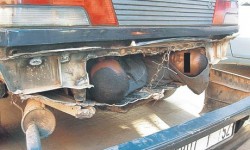What’s interesting here is the ordinariness of smuggling as part of the plot. Le Carré wouldn’t think of making such a banal activity The Crime in one of his own novels. Rather, the mechanism of the key character’s getting into the country is just one more detail to be investigated and explained by the spies. Denmark and Sweden as countries smugglers have to cope with are unusual. Note the randomness – the migrant hoped to get to Copenhagen and would’ve liked Gothenburg but ended up in Hamburg. Although this is fiction, it’s a plausible account.
From A Most Wanted Man, by John Le Carré, 2008
‘How did you get to Hamburg in the first place?’
‘It is immaterial’ . . .
‘Didn’t you know that they treat refugees worse in this town than anywhere in Germany?’
‘Hamburg will be my home, sir. It is where they bring me. It is Allah’s divine command.’
‘Who brought you? Who’s they?’
‘It was combination, sir.’
‘Combination of what?’
‘Maybe Turkish people. Maybe Chechen people. We pay them. They take us to boat. Put us in container. Container had little air’. .
‘We? Who’s we?’
‘Was group, sir. From Istanbul. Bad group. Bad men. I do not respect these men.’
‘How many of you?’
‘Maybe twenty. Container was cold. After few hours, very cold. This ship would go to Denmark. I was happy.’
‘You mean Copenhagen, right? Copenhagen in Denmark, the capital.’
‘Yes . . . to Copenhagen. In Copenhagen, I would be arranged. I would be free from bad men. But this ship did not go immediately Copenhagen. This ship must go first Sweden. To Gothenburg. Yes? . . In Gothenburg, ship will dock, ship will take cargo, then go Copenhagen. When ship arrive in Gothenburg we are very sick, very hungry. On ship they tell to us: “Make no noise. Swedes hard. Swedes kill you.” We make no noise. But Swedes do not like our container. Swedes have dog.’ He reflects a while. ‘”What is your name, please?” What papers, please? You are from prison? What crimes, please? You escape from prison? How, please?”‘ Doctors are efficient. I admire these doctors. They let us sleep. But God willing I must escape. To escape to Sweden is no chance. There is NATO wire. Many guards. But there is also toilet. From toilet is window. After window is gate to harbour. My friend can open this gate. My friend is from boat. I go back to boat. Boat takes me to Copenhagen. At last, I say, In Copenhagen was lorry for Hamburg. Sir, I love God. But the West I also love. In West I shall be free to worship Him.’
‘A lorry brought you to Hamburg?’
‘Was arranged.’
‘A Chechen lorry?’
‘My friend must first take me to road.’
‘Your friend from the crew? That friend? The same guy?’
‘No, sir, was different friend. To reach road was difficult. Before lorry, we must sleep one night in field.’ He looked up, and an expression of pure joy momentarily suffused his haggard features. ‘Was stars. God is merciful. Praise be to Him.’
Wrestling with the improbabilities of this story, humbled by its fervour yet infuriated as much by its omissions as his own incapacity to overcome them, Melik felt his frustration spread to his arms and fists . . .
‘Where did it drop you off then, this magic lorry that showed up out of nowhere? Where did it drop you?’
But Issa was no longer listening . . .
pp 11-13


